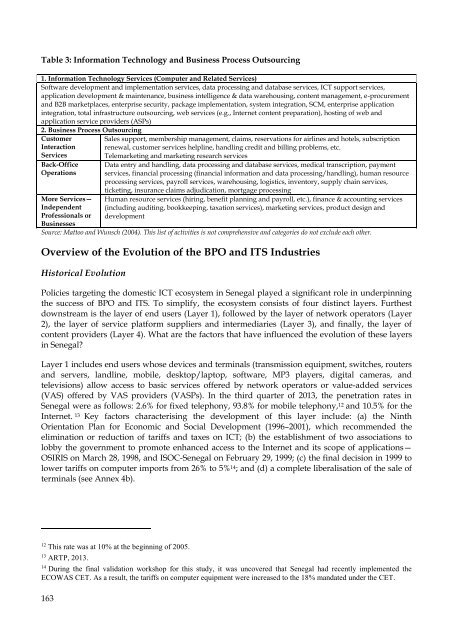CASE STUDIES FROM AFRICA
30769-doc-services_exports_for_growth_and_development_africa
30769-doc-services_exports_for_growth_and_development_africa
Create successful ePaper yourself
Turn your PDF publications into a flip-book with our unique Google optimized e-Paper software.
Table 3: Information Technology and Business Process Outsourcing<br />
1. Information Technology Services (Computer and Related Services)<br />
Software development and implementation services, data processing and database services, ICT support services,<br />
application development & maintenance, business intelligence & data warehousing, content management, e-procurement<br />
and B2B marketplaces, enterprise security, package implementation, system integration, SCM, enterprise application<br />
integration, total infrastructure outsourcing, web services (e.g., Internet content preparation), hosting of web and<br />
application service providers (ASPs)<br />
2. Business Process Outsourcing<br />
Customer<br />
Interaction<br />
Services<br />
Back-Office<br />
Operations<br />
More Services—<br />
Independent<br />
Professionals or<br />
Businesses<br />
Sales support, membership management, claims, reservations for airlines and hotels, subscription<br />
renewal, customer services helpline, handling credit and billing problems, etc.<br />
Telemarketing and marketing research services<br />
Data entry and handling, data processing and database services, medical transcription, payment<br />
services, financial processing (financial information and data processing/handling), human resource<br />
processing services, payroll services, warehousing, logistics, inventory, supply chain services,<br />
ticketing, insurance claims adjudication, mortgage processing<br />
Human resource services (hiring, benefit planning and payroll, etc.), finance & accounting services<br />
(including auditing, bookkeeping, taxation services), marketing services, product design and<br />
development<br />
Source: Mattoo and Wunsch (2004). This list of activities is not comprehensive and categories do not exclude each other.<br />
Overview of the Evolution of the BPO and ITS Industries<br />
Historical Evolution<br />
Policies targeting the domestic ICT ecosystem in Senegal played a significant role in underpinning<br />
the success of BPO and ITS. To simplify, the ecosystem consists of four distinct layers. Furthest<br />
downstream is the layer of end users (Layer 1), followed by the layer of network operators (Layer<br />
2), the layer of service platform suppliers and intermediaries (Layer 3), and finally, the layer of<br />
content providers (Layer 4). What are the factors that have influenced the evolution of these layers<br />
in Senegal?<br />
Layer 1 includes end users whose devices and terminals (transmission equipment, switches, routers<br />
and servers, landline, mobile, desktop/laptop, software, MP3 players, digital cameras, and<br />
televisions) allow access to basic services offered by network operators or value-added services<br />
(VAS) offered by VAS providers (VASPs). In the third quarter of 2013, the penetration rates in<br />
Senegal were as follows: 2.6% for fixed telephony, 93.8% for mobile telephony, 12 and 10.5% for the<br />
Internet. 13 Key factors characterising the development of this layer include: (a) the Ninth<br />
Orientation Plan for Economic and Social Development (1996–2001), which recommended the<br />
elimination or reduction of tariffs and taxes on ICT; (b) the establishment of two associations to<br />
lobby the government to promote enhanced access to the Internet and its scope of applications—<br />
OSIRIS on March 28, 1998, and ISOC-Senegal on February 29, 1999; (c) the final decision in 1999 to<br />
lower tariffs on computer imports from 26% to 5% 14 ; and (d) a complete liberalisation of the sale of<br />
terminals (see Annex 4b).<br />
12<br />
This rate was at 10% at the beginning of 2005.<br />
13<br />
ARTP, 2013.<br />
14<br />
During the final validation workshop for this study, it was uncovered that Senegal had recently implemented the<br />
ECOWAS CET. As a result, the tariffs on computer equipment were increased to the 18% mandated under the CET.<br />
163




